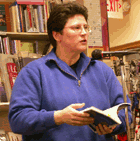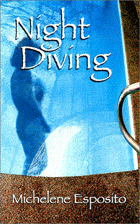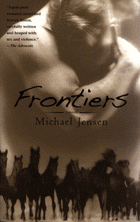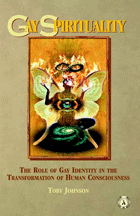 Perhaps the most prolific writer and
reviewer working in alternative literature, today—
Perhaps the most prolific writer and
reviewer working in alternative literature, today—(couldn't help it, Lori...your reviews are everywhere...and you're the recipient of
3 of Stonewall Society's awards)
In this issue, Lori Lake
reviews:
• Night Diving by Michelene Esposito
• Night Diving by Michelene Esposito
• Frontiers by Michael Jensen
• Gay Spirituality: The
Role of Gay Identity in the Transformation of Human ConsciousnessBy
Toby Johnson
 Night Diving Night Divingby Michelene Esposito Spinsters Ink 2002 228 pgs $14.00 ISBN: 1883523524 In Rose Salino’s life, bad things happen in threes: she’s dumped by her lover, loses her job (because she worked with her lover at a restaurant she had always considered “ours” – which wasn’t), and then her grandmother dies necessitating a flight from San Francisco to her childhood home in Long Island, NY. And so begins a journey in the present as well as in the past. Rose’s first person tale is bookended by events in the present, while the bulk of the novel tells the story of her youth. In a crisp, fresh, and often funny voice, she tells of her early struggles with her manic-depressive mother, of feeling alone and outside the pale during her school years, and most of all, of her friendship with Jessie who not only had a screwed up mother similar to Rose’s, but also carried hidden wounds of traumatic abuse. Much of Rose’s description of her childhood is moving, and with her fine prose, Esposito never lapses into melodrama. “I was nine the first time my mother got sick, leaving me with an emptiness that clawed at me like some little trapped animal. It was as if some faceless man had taken her away in the middle of the night and because I could not yet feel where she ended and I began, had taken me with them. I awoke one morning to find her shell and a hugeness that grew louder and louder and more panicky inside me. The first aloneness” (p. 34). The way Rose attempts to make sense of her world, to grow up, to find a place for herself is by terms touching and comical. I laughed out loud when Rose describes her friend’s enormous Newfoundland dog: “She was, I was sure, some mix of black bear and water buffalo, definitely bigger and heavier than me, with long black fur and a mouth I envisioned snapping off my leg in one jagged bloody chomp” (p. 22). Esposito has a delightful sense of timing as well as the ability to evoke character, particularly Rose’s, in ways that kept me glued to the book. For instance, at her grandmother’s funeral, she nervously connects back up with childhood friend Jessie, and thinks this: “I can’t even tell you why I’m so damn nervous except that I don’t know where to start. You can’t start from where you left off because that was a dozen years ago and you end up feeling like William Randolph Hearst clutching a sled, rocking back and forth in some dark room, whispering, ‘Rosebud, Rosebud’” (p. 116). Esposito’s ability to juxtapose flashes of comedy into the story is illuminating in the way that unexpected lightning allows for brief glimpses into dark places. By the time the events of the past catch up with the quandaries and disasters of the present, it’s clear that Rose has the ability to rise above her circumstances—but will she make the right choices in order to do so? She has the possibility of a life with Jessie, but can she let go of her hang-ups and really communicate with the people she loves? “Love is knowing a person’s tender spots, the places where the skin is transparent, not fully formed, like the clear membrane that holds a yolk round even after you separate it from the white. Love is standing guard over a beloved’s yolk” (p. 219). Musings like that are just lovely and endeared Rose to me forever. How she gets to the point where she can stand over someone else’s yolk, much less her own, makes for a wonderful story. This is a book that shouldn’t be missed.
|
 Frontiers Frontiersby Michael Jensen Pocket Books, 2000 $14.95/312 pgs ISBN: 0671027212 John Chapman, a 24 year old town-dweller who is hiding that he is homosexual, ends up on the run in November 1797. He’s had an affair with a Major in the British Army and been found out. From the unexpected violence of the opening pages to his journey—first in Lower Canada, then Pennsylvania and onward as he travels West hoping for his own land claim—it is clear that Chapman is an innocent. He has no frontier skills, no horse, no weapons, and some serious doubts about his courage, most of which were implanted by his abusive father. But he does have determination to try to make it to an outpost to stake his claim or die trying. If he can make it to the Warren Outpost and get free supplies and a parcel of his own land, he thinks his troubles will be over. Despite the snow and ice, he manages to cross the Allegheny Plateau, but is lost, physically spent, and out of food. Days—perhaps hours—from death, he comes upon a cabin in the wilderness where he is reluctantly taken in by the threatening and mysterious Daniel McQuay. From this point on, the characters he meets (Daniel, George Chase in Franklin, the solitary Indian woman Gwennie, and the charmingly handsome Palmer Baxter) all have a huge impact on his life. Over the long winter, Daniel teaches him survival skills, but he wants something and eventually scares Chapman away. George Chase then lets him stay in a vacant cabin, but he wants something. Chapman doesn’t know what Gwennie wants. It’s clear Palmer wants Chapman, but our hero isn’t about to succumb to the kind of love and attraction that has already gotten him in trouble and cost a man his life. Despite the fact that Chapman manages to resist Palmer’s charms initially, he still has to deal with small-mindedness, sexism, racism, the ignorant swath of compassionless “Christians,” bad weather, and new enemies. And old enemies. Lurking in the midst of Chapman’s seemingly safe world is an evil enemy who has the capacity to turn his world upside down and who, of course, does just that. Injuries, deaths, and intrigue ensue, and I was at the proverbial edge of my seat through most of the last half of the book. The tale is wonderfully told. Jensen’s dialogue is fresh and realistic, giving an accurate flavor of late 18th century while not overwhelming the reader with colloquialisms. Chapman has a sense of humor, especially about his failure to be a tough, he-man type. He displays a gentleness and humanity many of the settlers lack that made me identify with and love him. His narrative of the weather and environment is balanced perfectly as in this lovely description: “Lightning flashed against the darkening sky, giving me an excuse to turn away. Already dark clouds the color of ugly bruises and hateful intentions were closer, bearing down on us as surely as winter on autumn. Occasional gusts of wind rumbled own the valley rippling through the treetops, their leaves trembling suddenly in the sunlight like a million green-winged birds in flight” (p. 263). Jensen has crafted a compelling story the likes of which I have never read before. I am not aware of any historical drama/adventure/romance based upon such a well-rounded and mesmerizing gay character. John Chapman’s first person account is riveting. This is bildungsroman of the highest order, a story of love, lust, greed, and striving set against the unforgiving American frontier. I can’t recommend it highly enough! |
 Gay Spirituality: The Role of Gay Identity in the
Transformation of Human Consciousness Gay Spirituality: The Role of Gay Identity in the
Transformation of Human Consciousnessby Toby Johnson Lethe Press 2004 $16.95/280 pgs ISBN: 1590210220 On a daily basis, gay people are inundated with negative messages in every realm: social, political, cultural, and religious—especially religious. Many, if not most, mainstream churches have deliberate proscriptions against homosexuality, and with all that we’ve seen lately in the news, there seems to be no end in sight to the strife. Despite the fact that each year scientists offer more proof that sexual orientation is genetic (i.e. that’s the way God made us), many churchgoers and clergy discriminate against gay people. Lost in the midst of the polemics and condemnations are millions of non-heterosexual people trying to make their way in a world where matters of the Spirit are land mines and the path of that same Spirit does not always appear accessible. In his marvelous new book on this topic, Toby Johnson writes: “There is a Sufi saying: ‘If the rose knew what the gardener’s care would result in come spring, it would joyfully bend to the pruning knife.’ Gay people experience pruning in late childhood and early adulthood. We realize the truth of our orientation and have to give up familial and cultural expectations of what our lives will be. Often we experience ridicule and ostracism by schoolmates and peers, along with rejection and disapproval by parents. Even if we grow up feeling it is okay to be gay, we experience confusion and trauma because we will not follow in the path that our parents, teachers, and role models have laid before us” (p. 239) It’s this very phenomenon that tends to alienate gay people from churches and from the life-force of the Spirit. For gay men, in particular, Toby Johnson’ book GAY SPIRITUALITY is a lifesaver. Part of Johnson’s thesis is that gays are very much “Outsiders” in American society, and because of that, gay people possess valuable knowledge and inspiration about the true nature of the Spirit. Gay people experience the world differently than others do, including being more aware of the polarities. Rather than exclusion from the world of God, religion, and spirituality, Johnson calls for all people to listen to and heed the wisdom gay people have to offer. Because human knowledge and understanding continues to grow, Johnson wants any person struggling with gay issues to know that we are in the middle of a huge transformation of human consciousness—a major paradigm shift. Because of this, there is much to learn and room for growth, all of which is likely to give anyone struggling with issues of the Spirit a fair amount of hope. Drawing from world religions, the Hero Cycle, Jungian thought, and dozens of other sources, Johnson discusses religion, spirituality, and sexuality from a variety of angles. With his background as a teacher, theologian, ex-Roman Catholic monk, and writer, this book has much to offer any person exploring spiritual paths. Ultimately, I found myself resonating strongly while reading part of the conclusion: “Being gay is a blessing… This discovery is an important part of spiritual maturation. As we understand how blessed we are, we begin to put out good vibes. When we realize that being gay is drawing a long straw in this life, we can forgive the world. We can accept things as they are with all the pain and loss that goes with being human. And when we do that we change the world” (p. 259). It is clear from this book’s premise (and that of the companion volume, GAY PERSPECTIVE: Things Our Homosexuality Tells Us About the Nature of God and the Universe), that Johnson is offer viable and life-changing alternatives for people, both gay and straight, to understand the search for a meaningful spirituality. This is a wonderful book to assist in that search. |